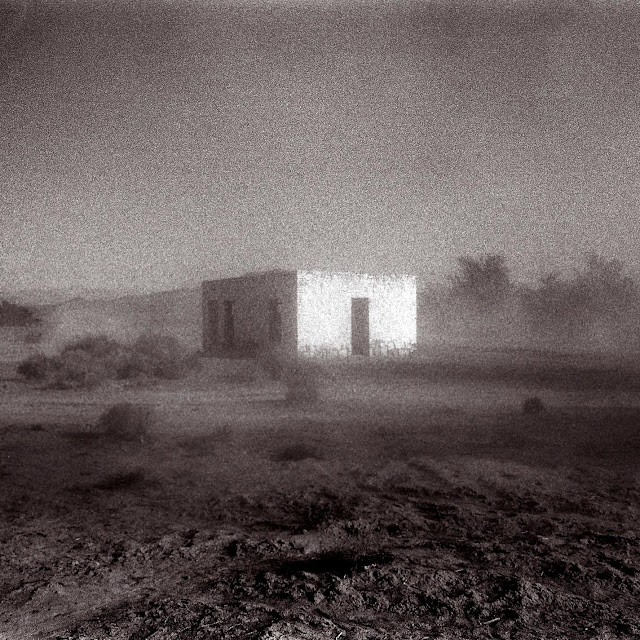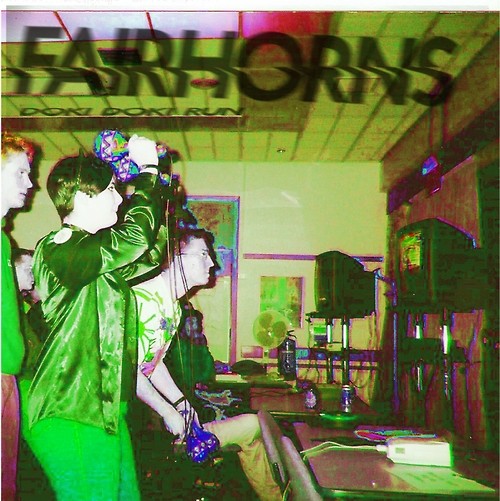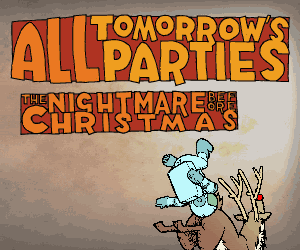
Bogged down amid the uncountable oast houses, as we wade through the pollen-swollen air and eloquent enquiries of disconcertingly refined touts the first thing discerned is familiarity. For Hop Farm seems to have all but entirely neglected progression ever since it was first expanded into a bona fide festival per se back in 2009 with the layout unchanged, the personnel only ever so slightly aged, and much of the line up the same if not as the edition aforenamed then as one of its two intermediary events.
A certain someone never to have trekked to such coordinates east out of London is José González, the oaty, folksy waft of whom befits the environs of Paddock Wood down to their every verdant blade. As such seeming inconceivably Nordic, he plays to the quintessence of cross-legged disaffection; the usual array of the purportedly fancily dressed. "I like dressing up in dresses. And getting fucked", a bewhiskered "bride" in a glinting swathe of satin garbles. Irregardless Heartbeats is as arresting as one may expect, even atop the unremitting Guetta-esque thud of the nearby waltzers. Perhaps the only convincing point of contact between Hop Farm and the Hackney Weekend – this utter and incontrovertible inescapability of the FM airwave hijacker – it somewhat surprisingly contrives to expose the tender, bass-less underbelly of González' work and only evokes a longing for an underlying throb. If only the two incongruous sounds could be attuned; if only The Knife could have been hauled out of self-imposed exile or (everything crossed) creative reclusion. Now that'd only epitomise progress...
Returning to the accenting of an unabashed deficiency in progression are Howling Bells who, figuratively unchanged in aeons, call almost religiously upon the eponymous début with the sweeping melodrama of A Ballad for the Bleeding Hearts differing only indiscernibly (if at all) from The Faith, lifted from rightfully neglected latest The Loudest Engine. Similarly, their self-reported 'new line up' varies but marginally with only a new bassist in tow: a rakish creature of rehearsed poise, his faux debonair intrigue clashes with his newfound counterparts as Where Them Girls At? did just moments ago with González.
They continue to clatter through Broken Bones; Setting Sun; Low Happening with a guileless excuse for aplomb and although Juanita Stein remains just about as alluring as ever, musically they've tired. Indeed given the skyrocketing emergence of swoonsome starlets such as Sharon Van Etten and St. Vincent (amongst innumerable others) their contemporary relevance has to be seriously questioned and with their candidly rubbish Radio Wars effort mercifully lost in transmission today – an ever-ascending Nightingale aside – they appear to have tuned out at any moment we may zone in. It's not often the vapid gaze of disinterest distressed across the faces of the omnipresent and unflinchingly heavy-handed Specialized Security which tends to pierce through the front few rows is reflected right back at these burly henchmen but it's today achieved as detachment again dominates. Glistening as Howling Bells was over half a decade ago, it now sounds as though an ethanol-soused desert waterhole emptying with a glib trickle as any originality appears to have seeped out from their every pore. It's been something of a dumbfounding bore and with Stein's guitar propped up by pregnancy, it's their last show before the September birth of her "baby Bell". A vague semblance of progress perhaps, or considerably more cynically maybe but an explanation as to what they've been up to since the début.
One glance about the 'Farm and the ludicrousness of Vince Power's lamenting of the Hackney Weekend cropping up the preceding pound-haemorrhaging bender becomes almost embarrassingly apparent as the respective clientele couldn't be more disparate in shape, shade and above all size. For Power could perhaps do with downsizing a touch: if not the site, then at least its stages for we're this year physically further from certain smaller bands than ever before, even with numbers well off capacity. Thankfully the already enormous Main Stage remains unchanged, if gradually it may be deconstructed of its own accord as speakers precariously dangle overhead and its defiantly No Sponsorship embellishment drifts away in the odd bluster of mild breeze.
Not that Billy Ocean could give two hoots, and a hoot is precisely what he proves to be: adorned in a beautiful pea-green suit and with his hair configured to be construed as a knot of barnacle-like dreadlock, he resembles an appositely thalassic soul with a heartwarming hum to melt all manner of things frozen. As though sent down from some place celestial as opposed to subaqueous however, he cajoles us into rapture as we "sing; dance; misbehave" with the Romford once-heartthrob. Arguably better suited to Butlins on one of its umpteen Ultimate '80s weekends that's all slackened ties and naff synths, Ocean beguiles as he fishes the likes of The Colour Of Love, Caribbean Queen and When the Going Gets Tough, the Tough Get Going from the back catalogue, wholly oblivious to half the side of his stage blowing away as a skivvy clambers the rigging, risking life or at the very least a limb or two in the process.
However resuscitating what ought forever be known as the Congos effect, immovable smiles are cast to the immutable singalong that is Ocean's first and finest, Love Really Hurts Without You. The old schmoozer's still got the illustrious and oft illusive it and, as he forthrightly queries mid-moonwalk: "Can I be your Loverboy?" prior to a riveting take on said song, we're his. Helplessly; unreservedly. His amorous investigation soon turns a little more sordid as he poses: "Would you get into my car?" ahead of a racy Get Outta My Dreams, Get Into My Car and although the 62-year-old may be resorting to the risqué as he veers off into progressively predatory territory, it's here more sax appeal than sex offensive. A fairly damp rendition of The O'Jay's Love Train charters a gratuitous, if foreseeable conga line as Ocean emits an inexorable smirk at both situation and song, before he departs effusing ersatz affection in a flurry of blown kisses and declarations of adoration. Leaving us with a sagacious slurring of "Don't get too merry", only he made us that way.
Dr. John then sounds as withered as he looks weathered, hocking up nondescript blues-hued stuff redolent of The Heart Of Saturday Night-era Waits, before George Clinton appears in a commensurately cobalt zoot suit baggier than Heaton Park. An unhinged insanity is as essential to a Parliament Funkadelic put-in as Tear the Roof off the Sucker (Give Up the Funk) and although shorn of his signature "rainbow dreadlocks", Clinton and his manically deranged cronies exude a variegated elation that's as infectious as it is engrossing: an untold plethora do nothing but nonsensical gesturing, drummers in motorway maintenance garb batter, Native American headdresses straight outta Felipe Ortiz Rose's dressing up box flutter and rollerskating nurses frolic in this picturesque 'scape of instability.
A lunatic roadshow we're delighted to see roll in, the troupe are unapologetically funky throughout and manage somehow to extract a substantial degree of coherency from their fluorescent mess. A pantomime villain as though penned by Carlo Collodi, P-Funk stalwart Sir Nose D’Voidoffunk materialises to handstand and hand out copious amounts of middle finger yet the funk still "don't stop" as Loopzilla hits its fully destructive stride. Tiny top hats and oversized guitars feature in what resembles Richard Burton's madcap envisaging of a cosmic funk orchestra and Clinton may be considered the berserk director of the show with baton exchanged for sabre as he and they not only keep their hour together but also keep it tight to an artery-restricting degree. The undisputed and largely underestimated musical genius of the day, Clinton is to Parliament Funkadelic what Tyler is to Odd Future (to futilely contemporise) and indeed there's a surreal, comparably scatty precariousness playing out up on stage that's all devil horn motioning and impromptu rutting as brawlage breaks out off it. Pandemonium promptly ensuing, they make Billy Ocean and his libidinous advances seem as sane as Frank. Or your average Futurehead for that matter...
They're on now and although few tears are secreted as we skip them all but entirely, there's an irritating simultaneity to these stages that's punctuated only by pauses of soundlessness. Thus if Hop Farm has ever had a flaw it's that its overall festival aesthetic feels distinctly fabricated and almost desperate. It's a qualm that this year remains open to further infection; as though an agape wound ready to attract yet more detritus and damning critique to its gunky appearance. It may be due to its proximity to the capital, or perhaps more pertinently to Kent civilisation but if it may at first whiff seem altogether civil then passive aggression and inauthenticity are but an overpriced alcohol away. Were authenticity even to exist these days in this sort of arena, Power's begrudged Beeb R'n'Blowout felt more festival-themed than this. And at this juncture we'll opt not to venture into the matter of its grotesquely oxymoronic shredded glitter-bedizened backstage bar that we were this year unable to venture into, what with this being a strictly No VIP venture and whatnot.
In further regurgitation of previous years (or 2010 to be precise) Ray Davies is next ejected from the festival's proverbial gullet. It's worth considering that if adopting a booking policy unwaveringly favouring old crocks, only so many are still active if indeed alive and the inclusion of Sir. Bruce Forsyth the following afternoon sniffs of veritable barrel scrapeage although Davies should and certainly once did have enough to enamour both the straw-hatted and the stroller-shoving. Pepped up by caffeine and propped up by printed lyric sheets, in the transpiring of these two years he appears to have become immoderately more doddering. He blurts some indecipherable yodel, before hobbling into a limp I Need You and although lovably decrepit, Davies seems to have hit the buffers; to have stagnated like a Hard Rock Café. "How you doin'? Where the hell are we?" he confoundingly quizzes, before going on to continue his inquisitions in song format with Kinks classic Where Have All The Good Times Gone? Its '60s swing measurably frail, it's an apropos interrogation as wherever they may be they ain't here with us right here; right now.
A rather intriguing juxtaposition then befalls he and his suitably proficient backing band as the tedious proto-political, antiestablishment propaganda of I'm Not Like Everybody Else is proceeded by Sunny Afternoon. Why the intrigue, then? Well, consider a field in Southeast England. It's a Friday afternoon and so-branded trustafarians constitute the bulk of what is a manifestly modest crowd. "I don't want to get a job like everybody else", Davies croaks unpleasantly on the former on what feels a palpably passé line thus making this, the alternative of "lazing" on what is rather thankfully an almost consistently "sunny afternoon" seem normality as opposed to rebellious anomaly. Somewhat ironically too, Davies has now made a living (and one that treads far from any Thin Line, one may presuppose) out of peddling such ho-hum lyrical tedium. He goes on to flippantly demand inebriant: "I want a beer. Someone get me a beer" in what appears to be some form of haughty facetiousness that when again contextualised by such lyrical libertarian guff, appears as self-contradictory as that glitter, glitz and gin beyond insurmountable fencing. Moreover that a Beck's eventually arrives just as he bemoans just how mean "the rich" were on a deflated Victoria only exacerbates such irony. "Let's hear it for The Kinks. A great band", he continues in a brazen affirmation that only serves to accent the impression that his past glories are paling and with his voice shot to crap, Davies' festival bill ubiquity is growing tiresome with his every boorish "whey hey" and his increasingly boring ways.
Some sway arm-in-arm, temples adorned with synthetic garlands in imagery evocative of Woodstock pastiche as Davies produces a fleeting Johnny Cash impression during Dedicated Follower of Fashion – irk aroused as a scummy byproduct of déjà vu over its "folk song" intro – although in the song that always was and still is his best, Waterloo Sunset, he's something just about still worth basking in. Today we may all miss the setting of the sun over the Thames although mercifully we'll be back in time to swarm around the "Underground" a little while. Otherwise, with its planted vodka jelly sellers and equally racketeering hijinks, it's been a set as paradoxical as the Hop Farm Music Festival itself. The Stranglers meanwhile pack out the supremely unimaginatively entitled Big Tent as they rattle off All Day and All of the Night with an inordinately greater deal of vim and vigour than it was ten minutes previous. If you may expect them to asphyxiate the thing, then they instead conjure a not insubstantial amount of déjà vu. Again. It's significantly superior to the uninspiring dross of No More Heroes at any rate.
This time last year the Eagles flattered to deceive and this time this year, with the stage splattered in pixelated spurts of sanguine haemoglobin, we indifferently await Peter Gabriel And The New Blood Orchestra. As nine fifteen finally arrives lights dim, cameras flicker although no action results. Even after a drab and largely unrecognisable cover of Bowie's Heroes action remains negligible as his 'Orchestra emit some quite stirring strings from behind a veil of luminosity.
As always, such a troupe taking to a strangely non-sodden field provides a stark contrast in cleanliness alone, both with regard to sound and pristinely suited style and if their soundscapes are infested with the avant-garde minimalism of Hidden – once again this particular reference pertains to a strange resonance in what is an outwardly strange performance – then Gabriel bears semblance to a really bad Phil Collins. For better or almost undoubtedly worse, although it's so unmistakably and bizarrely difficult to discern absolutely anything thus far. When not luxuriating in the frenzied bombast and scurrying flutes of These New Puritans' orchestral indulgences, musically Gabriel's 'Orchestra dine out on the lifework of Simon Jeffes and, when given such prominence both onstage and in terms of the sound, tonight's headliner is rendered quite extraneous to proceedings. His vocals awful and lyrics worse (Google those of San Jacinto. Please) he corresponds to the unwelcome old-timer regaling the agitated with numb tales of yore that meander slowly to utter irrelevance. Gabriel is just so within our current musical climate and certainly given this dishevelled contemporary state of economic turmoil, here's hoping Hop Farm throws up something somewhat more appealing this time next year. For Power's sake...
Jamie Holloway.























